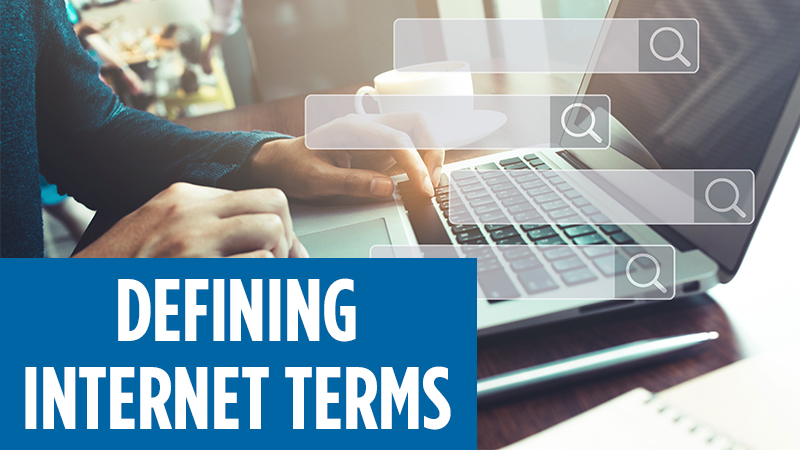We want to provide you with the best customer experience possible! By selecting your community, we can give you accurate and up-to-date information about our services.
Your community selection will be remembered in your browser for 30 days.
To change your community after the initial selection, click the location tool in the top right corner.
What if my community isn't listed?
Please select a community for us to provide you with an optimal experience during your visit on our website.

WCG offers eight residential Internet plans, providing several options tailored to different needs. It may be tempting to look at the plan with the highest numbers and assume it's right for you, but what do those numbers really mean?
Bandwidth, fibre optic, and upload speeds are common terms thrown around when discussing Internet plans, yet many consumers don't understand them. This handy guide will define each technical term listed on our Internet plans page to help you make an informed decision when choosing your plan and understand exactly what you're paying for.
When researching Internet, speed is typically the most important and sought-after factor. But how is it measured? Well, there are three main terms used to measure Internet speeds: bandwidth, download speed, and upload speed.
Bandwidth: Bandwidth is a way to help quantify Internet speed. It measures the amount of data that can be transferred over a network every second and is typically expressed in the units of megabits per second (Mbps). The higher the bandwidth, the more data that can be transferred and the more devices that can be connected.
Listed on all WCG Internet plans are two ways to measure bandwidth: download and upload speed. So, what's the difference?
Download Speed: Download speed is a way to measure how quickly your device can retrieve information from the Internet. If you wanted to look at a photo of a cute puppy, for example, your device would have to retrieve each bit of data of that photo from the Internet. How quickly it can retrieve the bits from that image depends on your Internet's download speed. Basically, the higher the download speed, the faster you see photos of cute puppies.
Upload Speed:
 If download speed is retrieving information from the Internet, upload speed measures how quickly your device can send information. Say you wanted to upload that same picture of the cute puppy to your Instagram account. How long it will take for the image to go from your phone to Instagram's servers depends on the upload speed of your Internet. Basically, the higher the upload speed, the faster you can share pictures of cute puppies with your friends.
If download speed is retrieving information from the Internet, upload speed measures how quickly your device can send information. Say you wanted to upload that same picture of the cute puppy to your Instagram account. How long it will take for the image to go from your phone to Instagram's servers depends on the upload speed of your Internet. Basically, the higher the upload speed, the faster you can share pictures of cute puppies with your friends.
No matter the amount of data you download or upload, unlimited usage is a standard across all of our Internet plans! That means you’ll never receive unexpected overage charges or have your Internet speeds throttled with us.
Speed may be a key factor to Internet plans, but how that speed is delivered to your home is just as important. Thanks to fibre-optic technology, unreliable and slow Internet is a thing of the past. But what is fibre? There are three key terms that WCG uses with fibre: fibre-optic, hybrid-fibre, and Fibre To The Home.
Fibre-optic: Fibre-optic is a term used to describe the leading technology and medium for delivering reliable and extremely fast Internet for modern-day needs. By using glass or plastic strands, data can be transmitted much faster than traditional copper cables that are found in older buildings. Fibre optics can deliver more data per second than copper and is far less prone to electromagnetic interference.
Hybrid-fibre: Hybrid-fibre technology provides legacy homes fitted with copper coaxial cables with extremely high download speeds. By supplying Internet hubs, or nodes, with fibre-optic connections, WCG can supply your home with fast internet speeds, even if your home is outfitted with outdated wiring. Hybrid-fibre technology allows maximum speeds without installing new fibre lines to your home.
Fibre To The Home: If upload speed is a top priority for your Internet needs, then Fibre To The Home, or FTTH, is the way to go. FTTH allows for synchronous upload and download speeds, a feat that traditional copper wiring cannot achieve.
To see if your home is eligible for our FTTH Infinite Internet plans, please contact Customer Service at 204.717.2502 (Toll Free: 1.800.665.3337).
IN CONCLUSION
While many other terms help define Internet services, this guide helps to get you started when looking at WCG’s Internet plans. By understanding speed terms and fibre optic technology, it's simpler than ever to choose the right plan for you and your needs.
Take a look at our fast and reliable Internet plans!
If you have any comments or questions, or you have a topic that would make a good blog post, please email us at marketing@westmancom.com